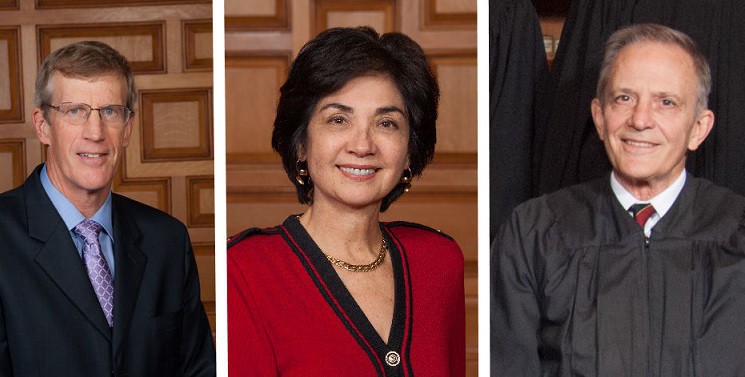Mass. high court says third justice will retire
By State House News Service | February 10, 2016, 14:24 EST
 Soon to retire Justices Robert Cordy, Fernande Duffly and Francis Spina of the Massachusetts Supreme Judicial Court give Gov. Charlie Baker a significant opportunity to shape the state’s high court. (State House News Service photos)
Soon to retire Justices Robert Cordy, Fernande Duffly and Francis Spina of the Massachusetts Supreme Judicial Court give Gov. Charlie Baker a significant opportunity to shape the state’s high court. (State House News Service photos) BOSTON – A third Massachusetts Supreme Judicial Court justice on Wednesday announced plans to retire before the next full session of the state’s high court begins, prompting Gov. Charlie Baker to name a 12-member panel to help him pick replacements.
Justice Fernande Duffly, who was appointed to the high court by then-Gov. Deval Patrick in 2011, will retire from the bench July 12, the court announced. In a statement, Duffly said she had planned to retire next year, but expedited her plans to help care for her husband. Duffly is the first Asian-American justice to serve on the court.
Baker’s special panel, the Supreme Judicial Court Nominating Commission, will be led by Lon Povich, the governor’s chief legal counsel, and Paul Dacier, who also heads the 21-member state Judicial Nominating Commission. Dacier is also an executive vice president at EMC in Hopkinton, where he serves as the information technology giant’s general counsel.
The governor’s screening commission will accept applications for the three positions through March 18. The group also includes retired corporate counsels, former SJC Chief Justice Roderick Ireland and Lisa Arrowood, the president of the Boston Bar Association.
“It has been a privilege to serve as a jurist in the Trial Court, the Appeals Court and the Supreme Judicial Court. My years on the bench confirm for me that broad and diverse perspectives make an enormous contribution to the decision making process,” Duffly said in the statement. “I had planned to leave the bench after serving for 25 years as a judge in 2017. When my husband’s recent surgery required me to devote more of my time to helping him fully recover, I moved up my retirement date.”
At 66, Duffly would not have had to retire until December 2019, when she will turn 70. Last week, justices Robert Cordy, 66, and Francis Spina, 69, announced their intentions to retire this summer.
Because two more SJC judges — justices Margot Botsford and Geraldine Hines — will reach the mandatory judicial retirement age of 70 before the end of Gov. Charlie Baker’s term, Baker is now assured the opportunity to nominate five justices to the seven-member high court in a single term, shaping its judicial philosophy.
“In effect there is going to be a brand new court, which is a great upside for a governor to really leave his indelible mark for years to come,” Martin Healy, chief legal counsel and chief operating officer of the Massachusetts Bar Association, said. “The only negative I see is that the court, just by the hemorrhaging of judges, is going to lose a tremendous amount of institutional knowledge that comes from individuals who have served on the bench for years.”
Duffly began her legal career as an attorney and then partner at the Boston firm Warner and Stackpole in 1978 and, working through the Volunteer Lawyers Project, provided pro bono legal services to indigent clients.
Former Chief Justice Margaret Marshall recalled crossing paths with Duffly during a time when female partners in law firms “were few in number.”
“I have known Justice Duffly for almost forty years: we met as young lawyers in Boston,” Marshall, who stepped down as chief justice in 2010 also to care for her husband, said in a statement. “I have always admired her commitment to access to justice for all and to strengthening the diversity of the bar. It is no surprise that she is recognized nationally for her many efforts to make ours a more inclusive profession, and a more just democracy.”
Born in Indonesia to a Chinese mother and a Dutch father, Duffly immigrated with her parents to Oregon when she was six years old.
Duffly served on the Probate and Family Court from 1992 to 2000 and on the Massachusetts Appeals Court from 2000 until 2011, when Patrick nominated her to the SJC. She became the SJC’s first Asian-American justice when she was sworn in.
“Informed by her own unique life experience, she has brought to her judicial work a keen insight into the challenges faced by immigrants, women, and persons of color,” SJC Chief Justice Ralph Gants said in a statement. “In her national leadership roles, including as a past President of the National Association of Women Judges, she has been a frequent lecturer, mentor and role model to women judges and lawyers in this country and around the world. I will miss her friendship, her wisdom, and her generosity of spirit.”
The other members of the SJC Nominating Commission are Roberto Braceras, Vice-Chair, JNC, Partner, Goodwin Procter LLP; Brackett Denniston, retired General Counsel of GE; retired Superior Court Justice Margaret Hinkle; Marsha Kazarosian, immediate Past President, Massachusetts Bar Association, partner, Kazarosian Costello; Joan Lukey, Partner, Choate Hall & Stewart, LLP; Elizabeth Lunt, Of Counsel, Zalkind Duncan & Bernstein; John Pucci, Partner, Bulkley, Richardson and Gelinas, LLP; and Carol Vittorioso, Vice-Chair, JNC, Partner, Vittorioso & Taylor.
In a statement, the Baker administration said it would seek SJC applicants “who possess the temperament, ability and integrity to freely, impartially and independently interpret the laws and administer justice, and to work collaboratively with their colleagues in crafting opinions and administering the judicial branch of government. It also hopes to recruit applicants who represent not only the geographically diverse parts of the Commonwealth, but also the diversity of our citizens.”
Written by Colin A. Young








